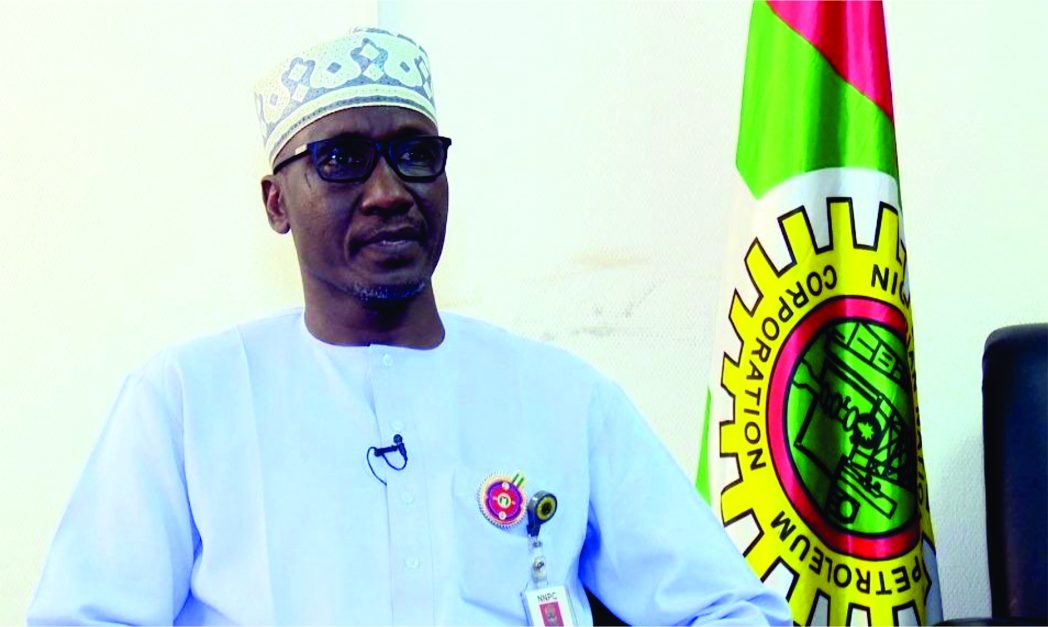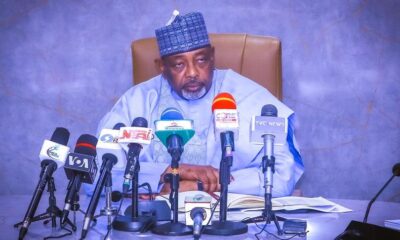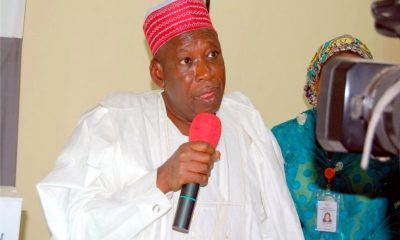News
NNPC Moves To Hand Off Refinery Operations

As its reform programmes gain traction, the Group Managing Director of Nigerian National Petroleum Corporation (NNPC), Mr Mele Kyari, yesterday, disclosed that the nation’s oil company will no longer be involved in the management of the nation’s refineries after their rehabilitation.
Kyari stated this in an interview on Arise TV breakfast programme, The Morning Show.
He disclosed that upon completion of the ongoing rehabilitation exercise, the services of a company would be procured to manage the plants on an Operations and Maintenance (O&M) basis.
“We are going to get an O&M contract, NNPC won’t run it. We are going to get a firm that will guarantee that this plant would run for some time. We want to try a different model of getting this refinery to run. And we are going to apply this process for the running of the other two refineries,” he stated.
He explained that the ultimate plan was to get private partners to invest in the refineries and get them to run on the NLNG model where the shareholders would be free to decide the fate of the refineries going forward.
He stated that this model, which is totally different from previous approach, would guarantee the desired outcome for the refineries.
Also speaking on a Channels TV breakfast talk show, Sunrise Daily, earlier in the day, the NNPC’s helmsman said the decision to finally end the fuel subsidy regime is in the interest of ordinary Nigerians as it would free up funds for the various tiers of government to develop basic infrastructure in the education, health, transport, and other sectors for their benefit.
“Subsidy is elitist because it is the elites that benefit from it. They are the ones that have SUVs, four, five cars in their garages. The masses should be the ones to benefit. There are many things wrong with the under-recovery because it makes us to supply more than is needed. This makes the under-recovery to be bloated because we unwittingly subsidize fuel for the whole of West Africa. That has to stop,” the NNPC boss submitted.
He explained that the removal of subsidy would automatically correct the distortions it created in the market such as products arbitrage and smuggling, stressing that it would also provide the needed impetus for the NNPC to establish retail outlets in neighbouring countries.
On the agitation in some quarters for a reduction in the price of kerosene, he said the corporation’s focus was rather on how to migrate all those who were still using kerosene for domestic cooking to the use of Liquefied Petroleum Gas (LPG) which is popularly referred to as cooking gas.
According to him, apart from LPG being a cheaper fuel than kerosene, it is also safer and more environment-friendly.
He said the Minister of State for Petroleum Resources, Chief Timipre Sylva, was championing policies to deepen the adoption of LPG for domestic consumption, adding that widespread adoption of LPG usage was the best solution to kerosene supply challenges in the long term.
On the situation with global crude oil price and supply, the GMD said things were shaping up.
“Crude oil price is improving by the day. Last week, it was $15 per barrel. Today, it is $32.79 per barrel. We believe the ongoing engagements between global oil producers will bring back demand and once that happens, the market will balance and fully recover by year-end”, he stated.
On the fight against the Covid-19 pandemic, Mallam Kyari who put the current total donations by players in the Oil and Gas Industry at N21billion said the sector was obliged to support the Federal Government in its efforts to bring relief to Nigerians.
He maintained that the donations were in kind and were designed to address three key areas of: provision of hospital consumables (face masks, test kits, etc.); provision of support services and facilities for patients (beds, ventilators, etc.); and provision and upgrade of health infrastructure that will outlive the Covid-19 pandemic.
He said the strategic interventions of the Oil and Gas Industry towards the fight against the Covid-19 pandemic in Nigeria were aligned with the objectives of the Presidential Taskforce on Covid-19 headed by the Secretary to the Government of the Federation, Mr. Boss Mustapha.
The Nigerian National Petroleum Corporation (NNPC) also said that the demand for Nigeria’s crude oil in March dropped by 6.8 million barrels due to the COVID-19 pandemic.
The Group Managing Director of NNPC, Mele Kyari, said this on Channels Television’s Sunrise Daily programme, yesterday.
Kyari said the drop in the demand for oil was not peculiar to Nigeria but global.
When asked how Nigeria’s crude is doing on the international market, he said, “Well, it is doing badly but it is improving. Last week, it went down to close to $15 per barrel but as I speak this morning, we are at $32.79 to a barrel.
“So, we think with all the engagements going on, countries going back to work like in Europe means consumption will come back, demand will rise because we have lost about 6.8 million barrels of demand in March alone.
“And when things come back, the market will balance and make sure that the market recovers. I am sure you are aware of all the engagements that have gone on internationally with OPEC, producers and the partners to make sure that there is balance.”
News
Bill For Compulsory Counselling For Convicted Corrupt Nigerians Scales Second Reading
A bill to amend the Corrupt Practices and Other Related Offences Act 2000 has passed its second reading in the House of Representatives.
The bill, which mandates compulsory counselling and training for individuals convicted of corruption-related offences, was sponsored by Kayode Akiolu (APC-Lagos) during plenary on Wednesday.
Leading the debate, Mr Akiolu explained that the bill sought to amend Section 67 of the principal act, introducing new provisions that were not part of the original section.
“These additional provisions, found in subsections 2, 3, and 4 of the amendment bill, require judges and magistrates to not only impose imprisonment and/or fines on those convicted of corruption but also mandate a minimum four-week anti-corruption counselling and training.
“The counselling and training will be designed and delivered by the Anti-Corruption Academy of Nigeria (ACAN) and aims to address the psychological factors related to corrupt behaviour,” Mr Akiolu said.
Mr Akiolu emphasised that the training would help reform convicts by addressing their corrupt tendencies and could even transform them into advocates for anti-corruption efforts.
He added that this approach aligned with the reformative aspect of the criminal justice system, which focused on punishment and rehabilitation.
“As per subsection 4, the bill allows magistrates and judges to order convicts to cover the cost of their counselling and training, preventing additional financial burdens on the government,” the lawmaker noted.
Mr Akiolu further argued that if the bill is passed into law, it would strengthen the country’s fight against corruption.
Given the widespread negative impact of corruption, he urged the House to support the bill for the country’s benefit.
Following the debate, Speaker Tajudeen Abbas referred the bill to the relevant committee for further legislative consideration.
News
Judiciary, Media Key Pillars Of Democracy, Says CJN

The Judiciary and the Media are key pillars of democracy, the Chief Justice of Nigeria (CJN), Justice Kudirat Kekere-Ekun, has said.
Kekere-Ekun made this statement in her address at the 2024 National Conference of the National Association of Judiciary Correspondents (NAJUC).
The CJN was represented by Mr Abdulaziz Olumo, the Secretary of the National Judicial Institute (NJI).
“ The judiciary and the media occupy unique and complementary roles in any democratic society.
“ The judiciary serves as the guardian of justice, equity, and the rule of law, the media acts as the conscience of society, disseminating information, shaping public opinion, and ensuring accountability.
“ Together, these institutions provide checks and balances that strengthen the fabric of democracy,” she said.
Quoting Felix Frankfurter, a former U.S. Supreme Court Justice, she said: free press is not to be preferred to an independent judiciary, nor an independent judiciary to a free press. Neither has primacy over the other; both are indispensable to a free society.”
The CJN said this dynamic interdependence between the judiciary and the media presents opportunities and challenges alike.
“ The media is entrusted with the responsibility of informing the public about judicial activities, the judiciary relies on accurate and ethical reportage to enhance public confidence in its work.
“ However, the inherent power of the media to influence public opinion requires careful management, especially when its focus turns to judicial proceedings.
“ The question posed by Robert J.Cordy, a former Associate Justice of the Massachusetts Supreme Judicial Court, is pertinent here: “What happens when the free press turns its sights on the courts-scrutinizing, sensationalizing, and exposing the frailties of the judiciary while questioning its ethical standards and performance?”
“The media’s capacity to shape narratives and perceptions is undeniable” she said.
Quoting Jim Morrison , she said “Whoever controls the media controls the mind.”
According to her, this underscores the immense responsibility placed on journalists to report truthfully, fairly, and objectively.
“ Unfortunately, the commercialisation of news and external influences have led to the rise of sensationalism-a practice that distorts facts, erodes trust, and undermines the very essence of journalism.
“ Sensationalised headlines, such as the infamous 2016 headline “We raided the houses of ‘corrupt, unholy’ judges, says DSS,” can paint a skewed picture of the judiciary and its officers. Such reporting, often devoid of context, compromises the integrity of the justice system and misleads the public.
“ Closely tied to this is the issue of “trial by media,” where premature and often biased media narratives prejudge cases and infringe on the constitutional rights of individuals” she said.
She added that as Mahatma Gandhi rightly observed, “The sole aim of journalism should be service.” It is imperative for media practitioners to remain steadfast in their commitment to truth and objectivity.
To this end, she advised, the National Association of Judiciary Correspondents to take proactive steps to regulate the activities of its members.
“ This is not merely about enforcing rules but about fostering professionalism and safeguarding the credibility of the media.
“ The judiciary and the media must work as partners in progress.
“ To bridge the gap between these institutions, there is a pressing need for constructive engagement and mutual understanding.
“ Courts can provide the media with guidelines on judicial processes, courtroom decorum, and the nuances of court proceedings.
She noted that globally, courts have adopted initiatives to support the media’s role in reporting judicial matters.
For instance, she said the Supreme Court of Dakota’s media guide outlines protocols for courtroom reporting, while the UK ‘s Media Guidance document provides clarity on access and etiquette for journalists.
“ These examples demonstrate how structured collaboration can enhance the quality of judicial reportage.
“ In Nigeria, we can take a cue from these models by developing a comprehensive media guide tailored to our judicial landscape.
“ This initiative, which would involve inputs from NAJUC and judicial stakeholders, would not only enhance media access to courtrooms but also ensure that judicial activities are accurately and responsibly reported” she said.
She advocated that judiciary correspondents must make deliberate efforts to familiarise themselves with the rules and procedures of the courts.
She added that understanding these frameworks will enable journalists to navigate the complexities of judicial proceedings effectively and responsibly.
“ Training programs such as this conference play a crucial role in equipping judiciary correspondents with the knowledge and skills needed to report judicial matters accurately.
“ The theme of this year’s conference, “The Role of Courts in Enforcement of Judgments,” is both timely and significant, as it addresses an aspect of judicial work that is critical to upholding the rule of law and ensuring justice.
“ I commend NAJUC for its commitment to promoting accountability and transparency through its engagements with the judiciary.
“ As I conclude, I must emphasize the importance of credible journalism in strengthening public trust in the judiciary” she said.
She urged judiciary correspondents to prioritise the pursuit of truth and objectivity, resist undue influences, and remain steadfast in their commitment to ethical standards.
She commended the leadership of NAJUC, under the chairmanship of Mr Kayode Lawal, for its efforts in promoting professionalism among judiciary correspondents.
News
Senate Issues Arrest Warrant Against Julius Berger MD Over Road Project

The Senate has issued an arrest warrant for the Managing Director of Julius Berger Nigeria Plc, Dr Peer Lubasch, to appear before its Committee on Works.
The Tide’s source reports that the warrant was for Lubasch to explain the utilisation of funds appropriated for the reconstruction work on Calabar-Odukpani-Itu highway.
The warrant followed the adoption of a motion sponsored by Sen. Osita Ngwu (PDP- Enugu) and co-sponsored by Sen. Asuquo Ekpenyong (APC-Cross River) and Sen. Mpigi Barinada (PDP- Rivers) at plenary in Abuja, yesterday.
Ngwu, in the motion said, that the senate had mandated the committee on works to conduct investigation into the state of road infrastructure across the country.
He said that in furtherance to the investigative hearings, Julius Berger refused to honour invitations to provide details of its role in the Calabar-Odukpani-Itu highway project, in spite of receiving substantial public funds.
He said that this was worrisome, given the alarming discrepancies in performance among contractors on the project, with specific reference to Julius Berger for failing to meet delivery timelines.
Ngwu said it was the constitutional powers of the National Assembly under Sections 8 and 89 of the 1999 Constitution, as amended, to conduct investigations on any person or organisation responsible for administering public funds.
He said that the powers set out in section 6 of the legislative powers and privileges act empowered the Senate to issue warrants of arrest on persons in contempt of its proceedings.
The Tide source reports that the senate further ruled that President of the Senate, Godswill Akpabio, should sign the warrant, mandating the Julius Berger managing director to appear on a date to be communicated.
Akpabio said that the senate’s decision was in line with its constitutional powers under Section 89 of the 1999 Constitution (as amended).
“This senate will not tolerate the continued disregard of its authority.
“The managing director of Julius Berger must appear before the relevant committee, failing which further actions will be taken as prescribed by the constitution.
“The point of order, which was supported by the majority of the senators, highlighted the importance of upholding the integrity of the legislature.
“The senate committee will submit its findings to the National Assembly after the MD’s appearance.
“If there is any further failure to comply, we shall take the necessary steps to ensure respect for the constitution and the rule of law,” Akpabio said.
-

 Opinion5 days ago
Opinion5 days agoChild Rape: A Global Menace
-

 News5 days ago
News5 days agoStakeholder Hails Fubara Over Ekpeye Chieftaincy Title
-

 Business1 day ago
Business1 day agoNADF, NASC Partner To Boost Food Security
-

 Politics21 hours ago
Politics21 hours agoGanduje Gets February 13 Date For Hearing In Alleged Bribery Trial
-

 Politics5 days ago
Politics5 days agoAfter S’Court Victory, It’s Time To Work, Soludo Urges APGA
-

 Maritime5 days ago
Maritime5 days agoMOWCA, NIMET Collaborate On W’Africa Maritime Safety
-
Sports22 hours ago
Football Panacea For Peace, Creates Good Relationship – LG Boss
-
Nation20 hours ago
Senate Summons Wike Over Demolition Of Houses …Set To Investigate FCDA Activities

